Now in its seventh year, the Paul F. Pelosi Scholars Initiative (PSI) continues to uplift exceptional SFS sophomores and juniors through a dynamic program that fosters professional growth, meaningful mentorship and real-world learning. By funding public service internship placements and connecting students with accomplished practitioners and scholars, PSI equips them with the tools and networks needed to thrive in public service.
Established through the generous support of Paul F. (SFS’62) and Nancy Pelosi (H’02), who spearheaded a $1.6 million fundraising effort in 2018, PSI has become a cornerstone for nurturing talent dedicated to the common good and has supported 83 scholars since its launch. The initiative selects students who embody the Jesuit value of “people for others” and connects them to a growing network of alumni, mentors and public service practitioners.
In this series, we’re highlighting the 2025 Pelosi Scholars and their insights from their internships across the U.S. and abroad—starting with those focused on foreign policy, from the U.S. Congress to international think tanks.
Current SFS sophomores and juniors interested in becoming a Pelosi Scholar can apply here to the 2026 cohort now until September 28, 2025.
Dechen Atsatsang (SFS’26)
House Select Committee on the Strategic Competition Between the U.S. and the CCP
Dechen Atsatsang (SFS’26) spent her summer on Capitol Hill interning for the U.S. House Select Committee on the Strategic Competition Between the U.S. and the CCP. Her work included writing policy memos, drafting oversight letters and researching human rights abuses committed by the CCP, from the Uyghur genocide to repression in Tibet, Hong Kong and Southern Mongolia. A highlight of her summer was attending meetings with diplomatic delegations from countries like Australia, New Zealand and Taiwan.
“These sessions offered a unique glimpse into the practical application of foreign policy, showing how the committee engages with international partners on issues of shared concern and truly bringing my classroom learning to life,” Atsatsang says.
What drew you to this opportunity, and what aspects of the Committee’s work aligned most with your academic or personal interests?
I was especially drawn to interning for the Select Committee because of its focus on foreign policy and strategic competition—topics I’ve explored deeply in both my coursework and independent research. As someone interested in U.S.-China relations and the future of democratic governance, I was excited by the opportunity to contribute to policy discussions across a broad range of issues. The Committee’s bipartisan approach, along with its emphasis on diplomacy and human rights, resonated strongly with both my academic interests and personal values.
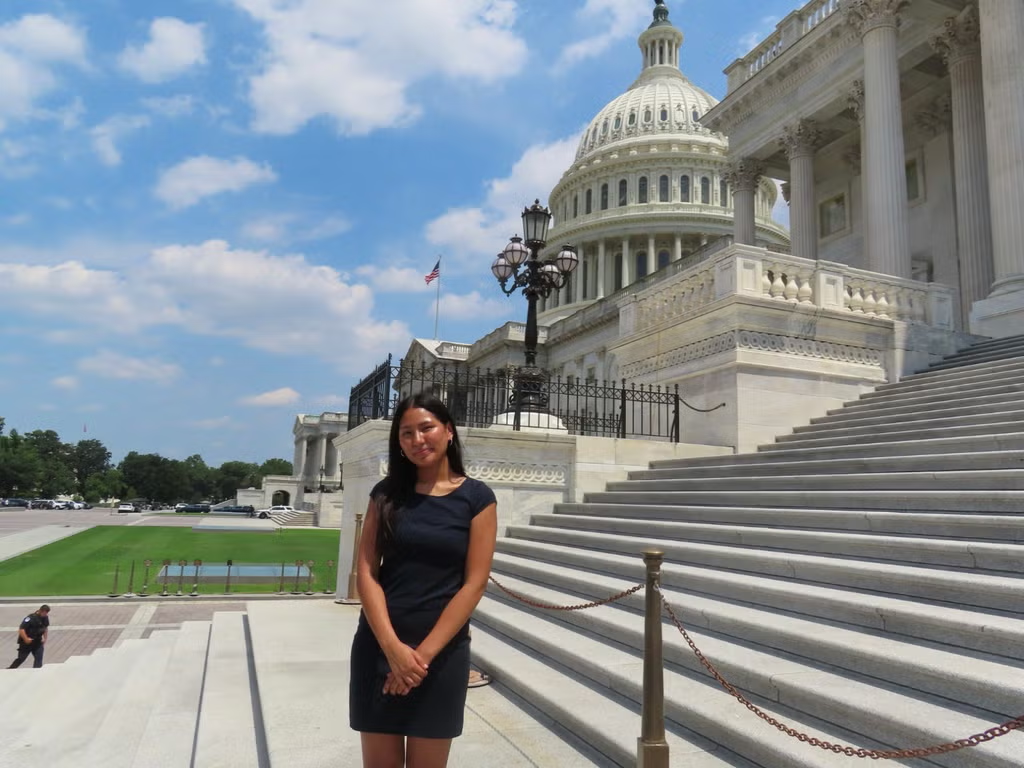
How did working in this field/your organization influence your career goals?
Before this internship, I had a more traditional view of foreign policy as something primarily shaped by the executive branch, but working on the Hill expanded my perspective on the extent to which congressional committees influence the policy conversation through hearings, oversight letters, investigative reports and engagement with external stakeholders. This experience not only deepened my understanding of the legislative process but also highlighted the profound impact of committed public service. It reinforced my desire to work at the intersection of foreign policy and human rights, and it made me more open to building a career that spans both government and civil society.
How has this experience shaped your view of public service?
My internship deepened my interest in public service by showing how meaningful policy work happens behind the scenes, even when progress is slow or not always visible. It also made me more aware of the political and structural challenges that public servants face, which I hadn’t fully understood before. However, rather than discouraging me, it pushed me to think more intentionally about how I want to contribute.
Jon Plummer (SFS’27)
Hudson Institute
Jon Plummer (SFS’27) worked at the Hudson Institute, a non-partisan think tank dedicated to innovative research and analysis across defense, international relations, economics, energy, technology, culture and law. As a research intern in the Office of Distinguished Fellow Walter Russell Mead, Plummer supported a weekly column in the Wall Street Journal, assisted with events and briefed other institute scholars on developments in international affairs.
“Hudson has introduced me to people actually living through the crises that I’m researching. The opportunity to hear their stories at speaker events and in conversation has helped me engage with issues in international affairs in a deeper and more nuanced way,” Plummer says.
How did working in this field/your organization influence your career goals?
I’ve always wanted a career in public service, but before my internship, I had a very narrow path for how to get there: graduate from Georgetown, finish graduate school and then find a public service job. However, after my internship, I saw individuals taking opportunities outside of government so they can eventually rejoin with more experience. Those people I met were often the public servants with the biggest impact, which makes me more confident in taking risks with my career.
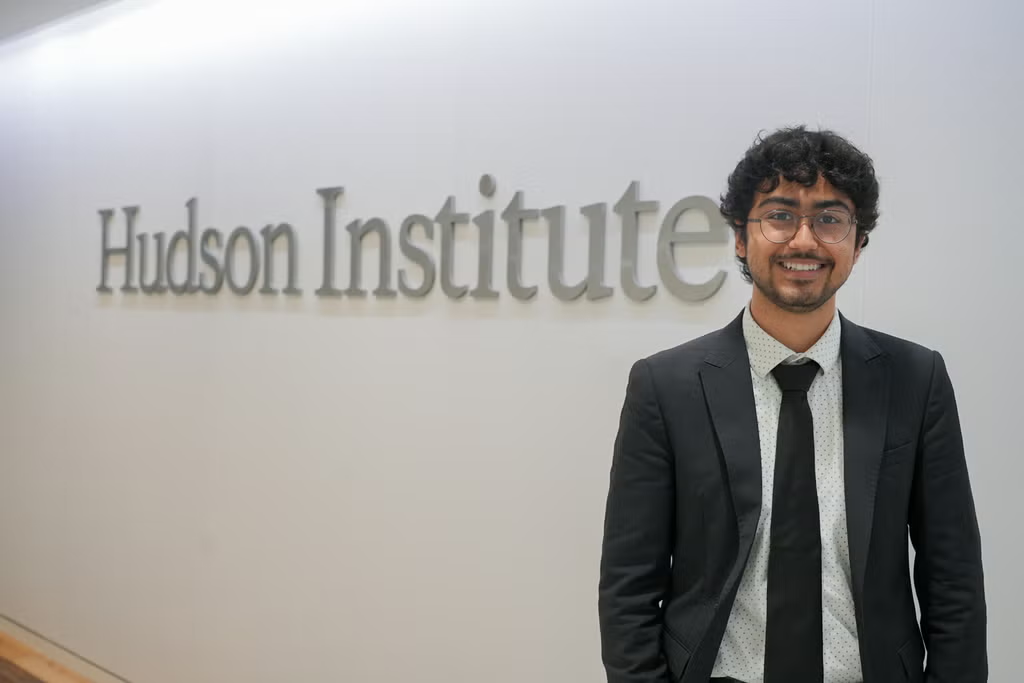
What do you wish you’d known before starting your internship?
Let your bosses know about every opportunity you are chasing so they can connect you early. If you list every opportunity you want in the State/Defense Department, the Hill or numerous other places, then you will be given a broader web of connections by your team.
How has this experience shaped your view of public service?
Because think tanks are at the intersection of NGOs, the private sector and the government, my internship gave me a more inclusive perspective on public service. I was able to see just how many organizations come together under the cause of service.
Isabelle Mansour (SFS’27)
Atlantic Council
Isabelle Mansour (SFS’27) spent her summer as a junior fellow with the Atlantic Council’s Rafik Hariri Center & Middle East Programs, working in the MENA Futures Lab. There, she supported business development and contributed to the Lab’s mission of reimagining the region’s economic future. Her original research focused on economic opportunities in post-conflict Syria, highlighting the role of female entrepreneurship in recovery, social stability and inclusive growth. Through this work, she advanced the Lab’s efforts to promote innovative policy frameworks that engage regional stakeholders, donors and the private sector in unlocking sustainable development across MENA.
“I gained a deeper understanding of how innovative policy, investment and diplomacy intersect to create real impact,” Mansour says.
What had the biggest impact on you during your internship?
My incredible coworkers and supervisors had the biggest impact during my internship. There was not a moment that I felt uncomfortable with approaching someone, regardless of position, for advice, potential collaboration or geopolitical insight on current events. The initiative I worked on is comprised of a group of incredible people who taught me so much about business development, areas of growth in the Middle East and the importance of innovation and entrepreneurship in developing economies.
How did working in this field/your organization influence your career goals?
I am profoundly grateful for the opportunity to pursue meaningful public service work. It not only strengthened my academic interests in international law and development but also affirmed my commitment to pursuing a career at the intersection of policy and economic empowerment. I look forward to carrying these lessons forward and using them to contribute meaningfully to the communities and regions I care deeply about.
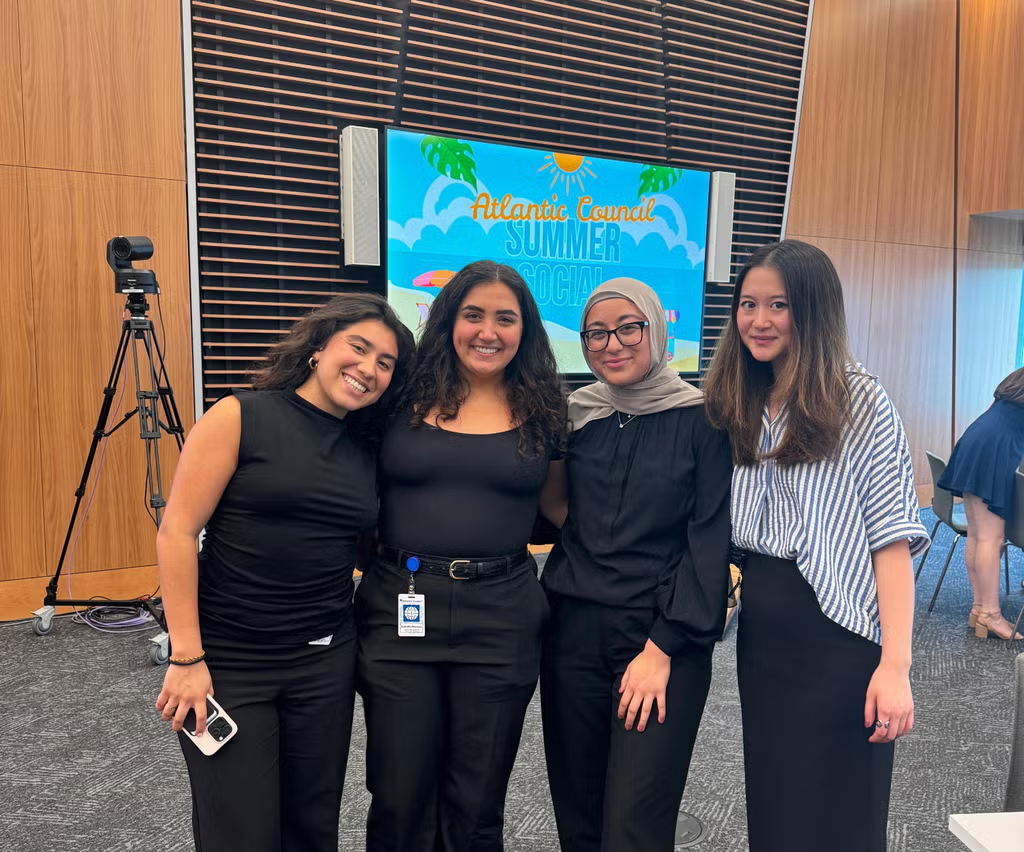
How has this experience shaped your view of public service?
This experience showed me that public service relies on open dialogue and diverse perspectives to make policymaking more effective and inclusive. During my time at the Atlantic Council, I was privileged to attend private and public roundtables that brought together high-level politicians, diplomats, business leaders and lifelong experts from across the MENA and South Asian regions. These discussions focused on pressing challenges such as economic diversification, conflict resolution and regional innovation.
Yajat Gupta (SFS’27)
United States Studies Centre
On the other side of the world, Yajat Gupta (SFS’27) spent the summer interning at the United States Studies Centre (USSC), a think tank based in Sydney, Australia. He witnessed firsthand how research, policy and diplomacy intersect in the Indo-Pacific. Living in Sydney not only broadened Gupta’s cultural horizons but also deepened his understanding of his international politics major.
“Working on U.S. politics, Indo-Pacific security and human rights and multilateral alliances at an Australian think tank has truly enabled me to see what I’ve learned in the classroom come alive,” Gupta says.
What are your favorite memories from the internship?
At the USSC, I learned how research briefs and think-tank events can directly inform debates and policy from Washington to Canberra to New Delhi and Tokyo. I got to sit in on Oceania trade negotiations between the governments of India and Australia. I had never realized the role of think tanks in diplomacy and policy making, and I also got to see behind the scenes of diplomatic engagements.
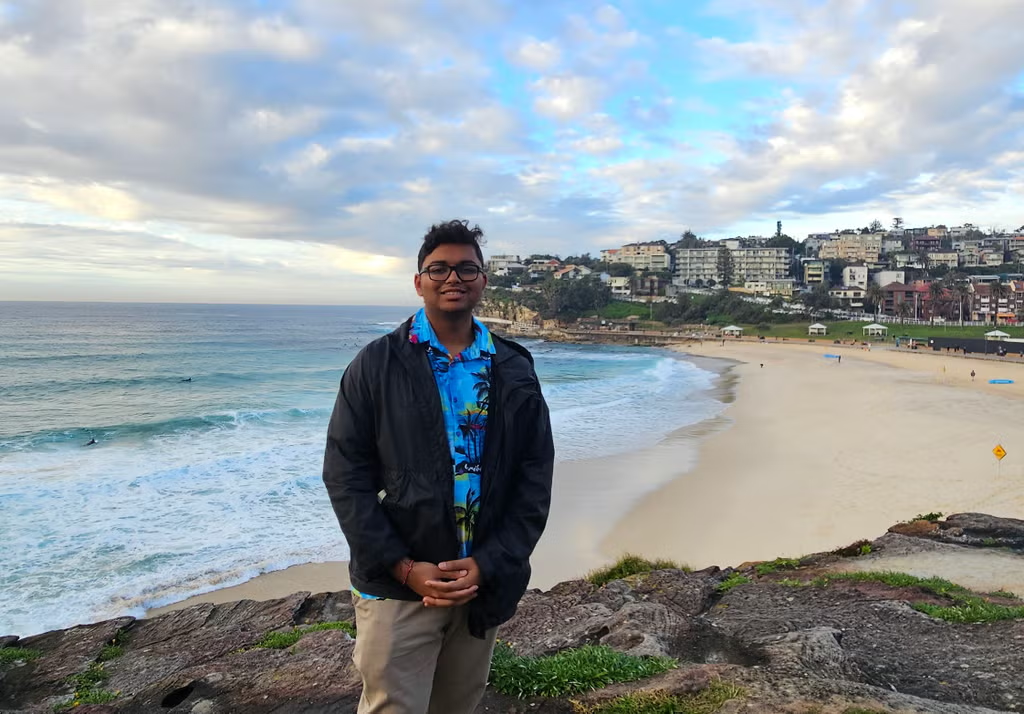
How did working in this field/your organization influence your career goals?
Working at the USSC sharpened my interest in pursuing a career in foreign policy, security and human rights with a focus on the Indo-Pacific region. I also discovered an interest in stronger U.S. engagements with allies and partners and am thinking more seriously about not only a career as a U.S. Foreign Service Officer, which I was already considering, but also about careers in multilateral, international institutions.
How has this experience shaped your view of public service?
I gained a new appreciation for think tanks in the policy ecosystem, realizing that public service comes in many shapes and sizes—not just working in government. I realized that public service is a broad coalition of scholars, practitioners, and policymakers that collaborate across sectors and borders to address shared challenges. My experience at the USSC showed me that meaningful impact can happen at the intersection of research and policy; such a task is just as important to public service as any other.
Ophelia Bentley (SFS’27)
Office of U.S. Senator Jeanne Shaheen
Back in DC, Ophelia Bentley (SFS’27) worked as an intern in the Office of U.S. Senator Jeanne Shaheen, where she researched and authored weekly memos to brief the defense legislative aide on military and political updates regarding Ukraine. Bentley also proposed and authored a six-page research memo on sanctions evasion in commodities markets for economic policy staff, which was circulated to and informed the Senate Foreign Relations Committee staff.
“Working on the Hill, I had a front row seat to the legislative process and the passage of major bills. In meeting with constituents, learning from staffers and working with evolving pieces of legislation, I could connect policy theory directly to the issues impacting my community members,” she says.
What had the biggest impact on you during your internship?
Hearing directly from constituents in meetings and through office tasks had the biggest impact on me during my internship. It really helped ground my policy research and career aspirations in the real-world impact of legislation passed in Congress. I specifically remember taking a phone call that the Senator received immediately after I watched the budget bill get passed in person on the Senate floor. I was the first person to inform her that the budget had passed, and she emotionally entrusted me with her story of her experience with the U.S. healthcare system and her personal reliance on a Medicare program that was slated for cuts. Even the administrative side of my internship on the Hill was filled with these sorts of firsthand insights into the significance of politics and policy for the people it affects.
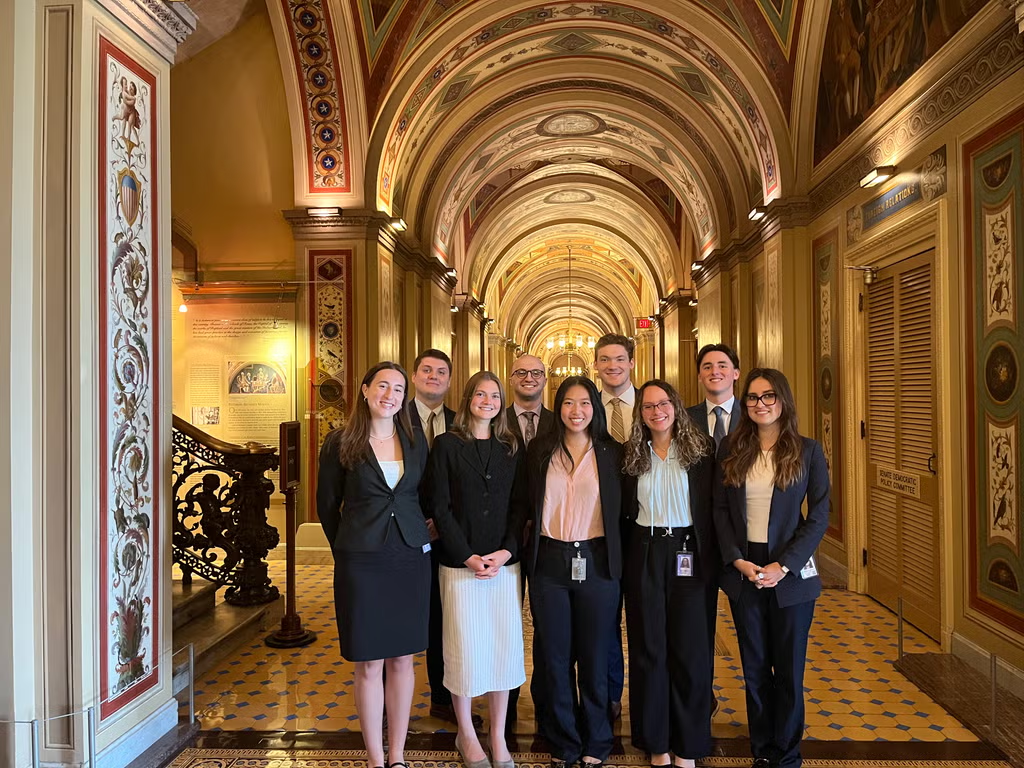
How did working in this field/your organization influence your career goals?
On one level, this internship influenced what careers and policy issues I am interested in within the umbrella of public service. For instance, completing a long-term research project on sanctions evasion by major commodity trading houses sparked a new interest in financial regulation and sanctions policy. On a broader level, I was not expecting to enjoy working in the Senate to the degree that I did and am now considering it as an element in my career path.
How has this experience shaped your view of public service?
The past six months have been unprecedented in the challenges they have posed for those passionate about public service. Around me, I have seen peers turn away from their planned paths in the public sector for more secure private sector jobs. Being a Pelosi Scholar during this tumultuous time has kept me grounded in my commitment to serving others.
